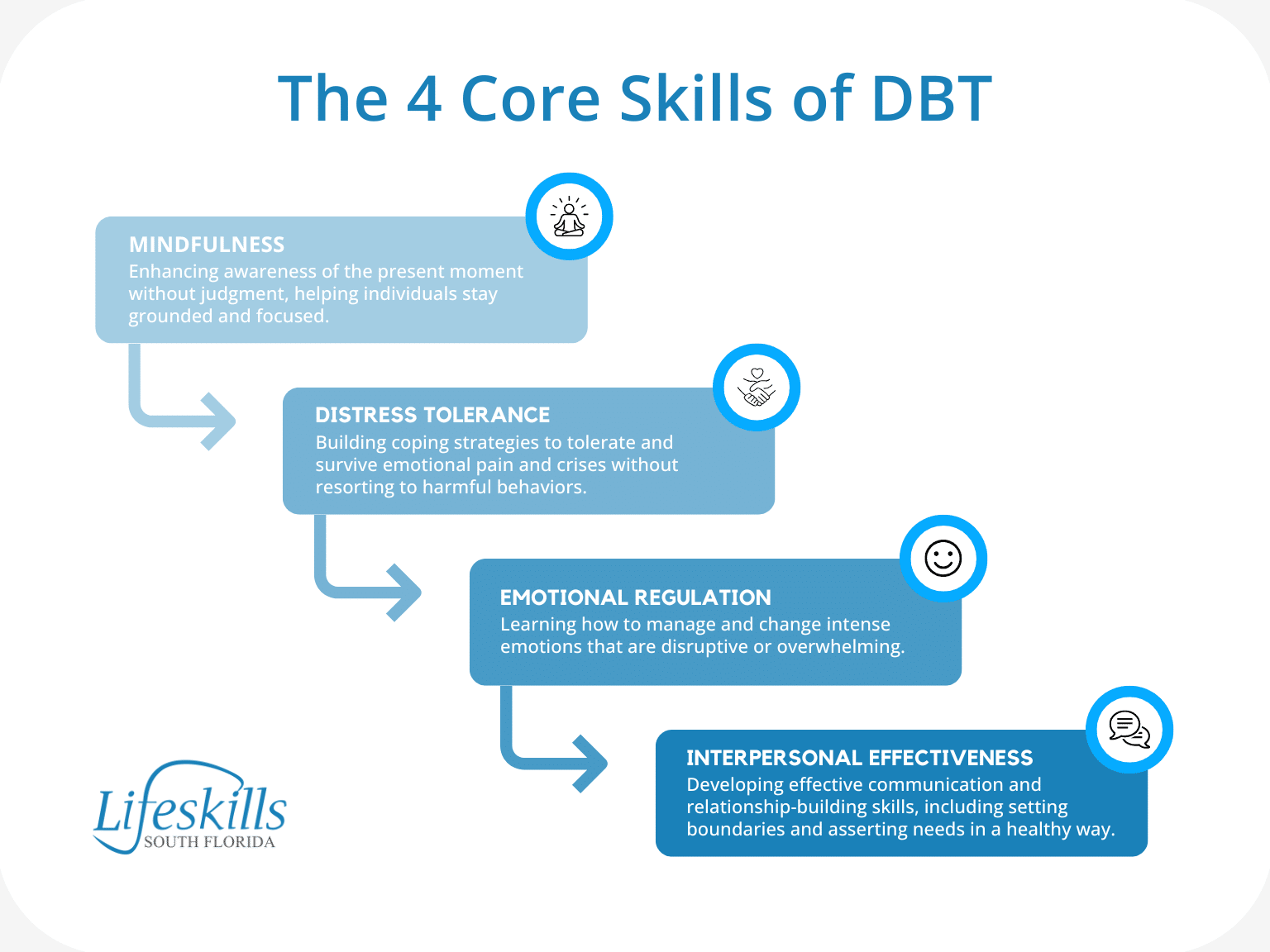Trigger warning: Self-harm. This article is for educational purposes. If you are having suicidal thoughts or feel at risk of harming yourself, you are experiencing a mental health emergency and need urgent support. Reach out to The National Suicide Prevention Lifeline 24/7 by calling or texting 988.
Self-harm is a complex issue often rooted in emotional pain and communication challenges. While it may provide temporary relief, self-injury can lead to a destructive cycle that is difficult to break. Fortunately, dialectical behavior therapy (DBT) offers a structured approach to self-injury healing.
DBT equips individuals with the tools to manage their emotions, improve relationships, and foster healthier coping mechanisms by focusing on four core skills — mindfulness, distress tolerance, emotional regulation, and interpersonal effectiveness. This blog explores how each of these skills plays a crucial role in overcoming self-harm behaviors and promoting lasting recovery.
What is Self-Harm?
Self-harm — sometimes referred to as self-injury — involves intentionally inflicting damage on one’s body without suicidal intent, often referred to as non-suicidal self-injury (NSSI). It encompasses a wide range of behaviors, including:
- Cutting, piercing, or burning the skin
- Embedding objects under the skin
- Bruising, hitting, or punching oneself
- Poisoning through an intentional overdose or ingesting non-consumable substances1
Self-harm also encompasses damaging behaviors like eating disorders and substance abuse disorders. Regardless of the method, self-harm is dangerous and can become life-threatening if not addressed.
Individuals who struggle with self-injury often feel isolated, hiding their pain from friends, family, and loved ones. Although it may provide temporary relief from overwhelming emotions, self-harm leads to a destructive cycle that becomes increasingly difficult to break.
What is DBT and Why Is It Effective for Self-Harm?
Initially developed for borderline personality disorder (BPD), DBT is a highly structured form of cognitive-behavioral therapy (CBT) designed to help individuals build a meaningful and fulfilling life. DBT focuses on teaching four core skills:
- Mindfulness
- Distress tolerance
- Emotional regulation
- Interpersonal effectiveness
These skills empower individuals to manage difficult emotions, improve relationships, and navigate life’s challenges more effectively.
While CBT centers on changing unhelpful thought patterns, DBT adds mindfulness, acceptance, and distress tolerance techniques to provide a more comprehensive approach to managing challenging situations. The “dialectical” aspect of DBT emphasizes balancing acceptance with change — two opposing ideas that work together to foster growth and resilience. DBT treatment typically includes group skills training and individual therapy in a clinical setting, with an entire skills training course often lasting around six months.
With over 15 significant clinical trials, DBT has shown strong evidence of reducing self-harm, improving treatment adherence, shortening time in treatment, and enhancing overall well-being. The therapy is grounded in the belief that many emotional difficulties stem from a lack of coping skills, and by teaching these skills, individuals can lead happier, healthier lives.2

How the 4 Core Skills of DBT Help Overcome Self-Harm
Understanding mindfulness and its role in coping with self-injury
Mindfulness is a practice that helps individuals focus on the present moment. Instead of worrying about the past or future, mindfulness teaches us to focus on what is happening right now. One of the key components of mindfulness is learning to detach judgment from our experiences, allowing us to observe our feelings without criticism.
For people who struggle with self-injury, mindfulness can be a helpful tool. Self-injury often comes from strong emotions and impulsive actions. The practice of mindfulness creates a pause between feeling these intense emotions and reacting to harmful behaviors. This intentional pause offers a moment to reflect, consider alternative coping mechanisms, and choose healthier responses.
With regular practice, mindfulness can help manage emotions and reduce impulsive actions. Here are a few simple mindfulness techniques to try:
- Breathing exercises – Take deep breaths in and out. Focus on your breathing to help ground yourself.
- Body scan – Slowly pay attention to different parts of your body. Notice any tension without judging it.
- Mindful observation – Use your senses to notice the sights and sounds around you to help you stay in the moment.
- Journaling – Write your thoughts and feelings without worrying about grammar or spelling. This can help you understand your emotions better.
How distress tolerance helps manage emotional crises
Distress tolerance helps individuals cope with emotional crises. Life is often unpredictable, and for some people, self-harm becomes a way to manage these challenging emotions. Distress tolerance teaches people to endure complicated feelings and accept uncertainty without resorting to harmful behaviors.
In DBT, this skill focuses on developing techniques to handle intense emotional pain in the moment. It encourages you to create a pause between experiencing distress and reacting impulsively. Strategies like deep breathing, self-soothing, and distraction can help individuals manage their emotions effectively.
The role of emotional regulation in coping with self-injury
Emotional regulation is one of the most challenging — yet most important — skills to learn in DBT. Self-injury often occurs during intense emotional highs or lows. To overcome self-harm, an individual must learn how to manage and understand emotions effectively.
In DBT, emotional regulation involves recognizing and labeling your emotions, which is the first step to understanding that feelings are not permanent — they come and go. DBT teaches strategies to help reduce the intensity of overwhelming emotions. This can include identifying triggers, practicing self-soothing techniques, and developing healthier coping mechanisms. Through these practices, individuals can gain control over their feelings and reduce the impulse to react impulsively when strong emotions arise.
Connecting through interpersonal effectiveness in self-injury healing
Self-harm often stems from communication difficulties. Many individuals struggle to express their needs, leading them to resort to self-injury instead of reaching out for help. Interpersonal effectiveness is a vital skill taught in DBT that focuses on developing strong communication skills to express needs and feelings effectively.
DBT helps individuals learn how to ask for what they need clearly and assertively. It also teaches the importance of saying no and setting healthy boundaries. By mastering these skills, individuals can foster self-respect and cultivate healthier relationships with those around them.
Through interpersonal effectiveness, people can reduce feelings of isolation and frustration, making it easier to seek support when needed. Ultimately, these skills help replace self-harm with constructive communication and connection.
Seeking Treatment Therapies for Self-Harm
Incorporating the four core skills of DBT can be transformative for those struggling with self-harm. By practicing mindfulness, distress tolerance, emotional regulation, and interpersonal effectiveness, individuals can break the cycle of self-injury and develop healthier relationships.
Self-harm recovery and DBT at Lifeskills South Florida
If you or someone you know is facing challenges related to self-harm, we are here for you. Lifeskills South Florida offers DBT via a comprehensive Linehan-compliant 13-week program and auxiliary DBT group therapy. Our self-harm treatment plans also incorporate other treatment methods and therapies, like CBT. Call the Lifeskills admission team today or complete our contact form and allow us to help you take the first step toward recovery.
Resources
1 Substance Abuse and Mental Health Services Administration. (2023). Self Harm.
2 Dialectical Behavior Therapy. (2022). DBT: Dialectical Behavior Therapy – Skills, Worksheets, & Videos. DBT




